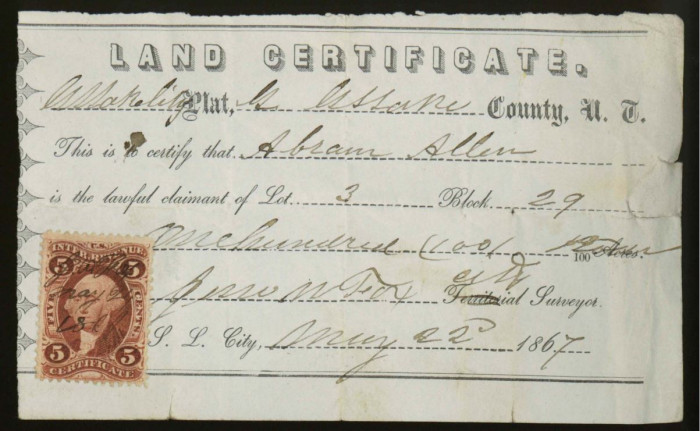What is a property title?
Property Titles: Your Guide to Understanding Ownership and Rights
August 23, 2023
Example of record for Abram Allen, Salt Lake County Land Title Certificates, series PC-001
What is a property title?
In the complex tapestry of real estate, few concepts are as central as the "property title." Whether you're a potential homebuyer, an investor eyeing a new venture, or simply someone looking to broaden their knowledge of real estate, understanding what a property title is and its implications is crucial. This blog post aims to demystify the concept of property titles, shedding light on their significance, components, and the role they play in property transactions.
Defining a Property Title
At its core, a property title is a legal term that signifies ownership rights and interests in a piece of real estate. Think of it as a certificate of authenticity for property ownership. When you hold a property title, you're essentially holding proof that you are the rightful owner of the property, and you have the legal right to use, occupy, and even transfer it.
Components of a Property Title
A property title is more than just a piece of paper. It's a compilation of various important elements that collectively define the ownership and rights associated with a property. Some of the key components include:
Property Owner: A property owner, as identified within the title, is the individual, organization, or entity that legally holds the reins of a piece of real estate. This identity is pivotal, as it signifies the authoritative figure responsible for the property's use, maintenance, and potential transformation.
Whether it's an individual making a home for their family, a corporation investing in commercial ventures, or even a trust managing assets, the property owner is the cornerstone upon which real estate transactions and possibilities are built. Possessing the title is akin to wielding a symbolic scepter of ownership, granting the ability to shape the destiny of the property within the confines of the law.
Legal Description: Within the canvas of property titles, the legal description emerges as a precise and intricate portrayal of a property's dimensions, contours, and geographical coordinates. This detailed cartographic depiction ensures that no ambiguity exists regarding the property's boundaries and location. Think of it as a GPS coordinate for legal ownership.
The legal description leaves no room for interpretation or uncertainty, accurately defining the scope of the property being referenced. This meticulous detailing serves as a safeguard against disputes arising from misunderstandings about property lines, ensuring that what is conveyed matches the reality of the land or real estate under consideration. The legal description is more than words on a page; it's the cartographic anchor that keeps property ownership grounded in accuracy.
Encumbrances: Encumbrances and liens add layers of complexity by introducing legal claims, restrictions, or obligations that encircle the property. These can range from mortgages secured by the property to easements granting others access rights.
Liens, often tied to financial obligations, can include unpaid taxes or unpaid contractors' bills. The title not only acknowledges these encumbrances and liens but also provides insight into their nature and potential impact on the property's use, transfer, or value. Understanding these intricacies is essential for both buyers and sellers, as they significantly influence the transaction process and the property's potential.
Rights and Interests: As a property owner, the title grants you an array of capabilities that encompass more than mere possession. The rights you hold may include the right to occupy the property, use it for specific purposes, lease it to tenants, mortgage it for financial leverage, or even transfer ownership to another.
These rights are the colors that paint the landscape of property ownership, allowing you to craft your vision for the property's present and future. However, these rights are not absolute and may be subject to local laws, zoning regulations, and other factors that shape the boundaries of your ownership palette.
History of Ownership: The chain of ownership, recorded within the title, is a sequence of transactions that showcases how the property has transitioned from one owner to another over time. This historical account not only establishes the property's legitimacy but also reveals the lineage of stewardship that has shaped its past.
It's a testament to the property's endurance and continuity, an unbroken thread that ties its past to its present. As a buyer or seller, delving into the chain of ownership can unveil intriguing narratives and connections that echo through the years, making the property more than just a structure – it's a living testament to the people who have called it their own.
Are there different types of property titles?
In the realm of property titles, there are a few different types that signify different levels of ownership and rights:
Fee Simple Title: This is the most comprehensive form of ownership, granting the owner complete rights over the property.
Leasehold Title: In this case, the owner has the right to use the property for a specified period, often seen in lease agreements for land or buildings.
Joint Tenancy Title: This title is often used for properties owned by multiple individuals, where each owner has an equal share and right of survivorship.
The Role of Property Titles in Transactions
When buying or selling property, the title plays a pivotal role. A clear and clean title is essential to ensure a smooth transaction. Before a property is sold, a title search is conducted to verify that the title is free from any encumbrances or claims that could affect the buyer's ownership rights. Title insurance is often purchased to protect against any unexpected issues that may arise after the transaction.
Do I have a clear title?
Owning a property title isn't just about possessing a piece of paper. It's about having the legal claim to a piece of land, a home, or a real asset that opens doors to countless opportunities. From developing the property to passing it down through generations, a clear property title grants you the power to shape its destiny.
Establishing a clear title for a property is a crucial step in any real estate transaction. A clear title ensures that there are no legal disputes, liens, or encumbrances that could cloud the ownership of the property. Here's a step-by-step guide on how to establish a clear title:
Engage a Title Company or Attorney: The first step is to enlist the services of a reputable title company or real estate attorney. These professionals specialize in conducting title searches and ensuring that the property's title is free from any issues.
Perform a Title Search: The title company or attorney will conduct a thorough title search on the property. This involves examining public records, deeds, mortgages, and other documents related to the property's history. The goal is to uncover any existing liens, encumbrances, or legal disputes that might affect the property's ownership.
Resolve Outstanding Issues: If the title search uncovers any issues, they need to be resolved before the title can be considered clear. This could involve paying off outstanding debts, resolving disputes, or obtaining releases for liens.
Obtain Title Insurance: Even after a thorough title search, there might be hidden issues that could emerge later. To protect against these unforeseen challenges, it's recommended to obtain title insurance. Title insurance provides coverage in case any undiscovered issues arise that could affect your ownership.
Review the Title Commitment: The title company will provide a title commitment, which is a document that outlines the conditions under which they are willing to issue title insurance. Review this document carefully to ensure that everything is accurate and in order.
Address Any Exceptions: The title commitment might list certain exceptions or conditions that are not covered by the title insurance policy. Work with the title company or attorney to address these exceptions and ensure that they don't pose a significant risk.
Clearing Outstanding Liens: If there are any outstanding liens on the property, such as unpaid taxes or unpaid contractors' bills, you will need to clear these before the title can be considered clear.
Obtain a Title Opinion: In some cases, a title attorney might provide a title opinion, which is a legal assessment of the title's validity. This opinion confirms that the title is clear and the property can be transferred without legal issues.
Prepare the Closing Documents: Once the title is deemed clear, the necessary closing documents can be prepared. These documents include the deed, bill of sale, and other paperwork required for the transfer of ownership.
Complete the Closing: During the closing process, all parties involved in the transaction gather to sign the necessary documents. The seller transfers ownership to the buyer, and funds are exchanged.
Record the Deed: After the closing, the deed is recorded with the appropriate government office, usually the county recorder's office. This step finalizes the transfer of ownership and ensures that the change in ownership is a matter of public record.
By following these steps and working closely with professionals, you can establish a clear title for a property, ensuring a smooth and secure real estate transaction.
In the world of real estate, a property title is more than just a legal document – it's a symbol of ownership, rights, and history. Understanding what a property title is and the components it encompasses is key to navigating property transactions with confidence. Whether you're a buyer, seller, or simply intrigued by the intricacies of real estate, a solid grasp of property titles is a valuable asset on your journey in the property landscape.

From Vacant to Abandoned, the Evolution of Decay
Routine maintenance is required to prevent any property from decaying. When no one is taking care of a property, time, and weather can quickly deteriorate its structural integrity and become a safety threat to the neighborhood.

Unlocking the secrets of your home's design and construction: A comprehensive guide to locating and utilizing your home's blueprints
Want to learn more about your home's design and construction? Here's everything you need to know about your home's blueprints to find out.

The Freshest House in Los Angeles: Step Inside The Fresh Prince of Bel-Air Home!
Have you ever wanted to see what’s inside the real Fresh Prince of Bel-Air house? With our timeline, now you can! Join us as we look at the freshest house in Los Angeles and explore its fascinating history.

The Iconic Father of the Bride House and Its Real History
The 1991 movie Father of the Bride is known for many things, but none stand out more than the Banks' house. Come with us to explore the real life history of the home!
